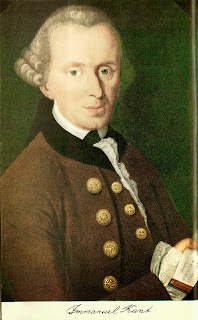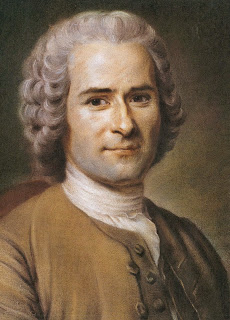Today in class we reviewed philosophy during the Enlightenment, specifically focusing on Kant and Rousseau, which was rather confusing. We started off by discussing some Kant.
 |
| Pictured: Kant |
He gave us a pretty nice definition of what is Enlightenment, namely that it was "man's emergence from his self-incurred immaturity."
 |
| Pictured: Not Kant |
Now, the hard part comes, defining Kant's definition! Basically, to Kant, immaturity wasn't making dirty jokes all the time, rather it was not using your head and not thinking independently. Kant believed (with just reasons) that many people were "immature" in this manner and simply were content with being ignorant.
 |
| This show justifies Kant's argument |
For Kant the main reason the majority of people were not enlightened was simply because they were too lazy to improve themselves or too afraid to step outside their boundaries. It should also be noted he pretty much thought all women were unenlightened because in this time it was not acceptable for them to think very independently. However, Kant believed that the public could gradually become enlightened. He said that this could be accomplished by the leadership of the few enlightened guardians of thought. In other words he meant that he believed in an enlightened ruler who would then seek to enlighten his subjects. He did not believe that it could work the other way around, that the enlightened subjects make the rulers enlightened. To Kant this would lead to conflict in which the rulers (or guardians) would become even more prejudiced and less reasonable in reaction to the uprising.
Kant also on clarified that enlightenment only really needed the freedom of the public use of reason, and that the freedom of the private use of reason did not matter as much. Private use of reason means basically whether you adhere to the duties of your job. If you are for example, a soldier, Kant would still expect you to obey orders, as it is your job. In this aspect, he believed a person could be restricted to follow what was needed of them by society. However, Kant said that you should still be able to discuss your thoughts freely in the public and employ your reason. He mainly advocated therefore for what we would know as the freedom of the press.
 |
| Pictured: Not Kant, Actually Rousseau |
We also briefly talked about Rousseau. Rousseau was another Enlightenment era philosopher, but he differed from Kant in a few ways. Like Kant, Rousseau believed that people should have individual freedom of expression of thought. One was that he had a somewhat more positive view on the basic nature of humanity. He also did not trust in rationalism as much. To him, because humanity was already good, trying to "civilize" someone could actually be hurtful to their freedom.
Rousseau also went beyond just wanting to have an enlightened ruler. Rousseau believed that a ruler did not derive their right to rule from force, God or nature but rather sovereignty should lie in common interests of the populace, known as general will. This idea of the general will led to the belief in popular sovereignty, wherein the people ruled themselves. These ideas would become incredibly influential.




No comments:
Post a Comment